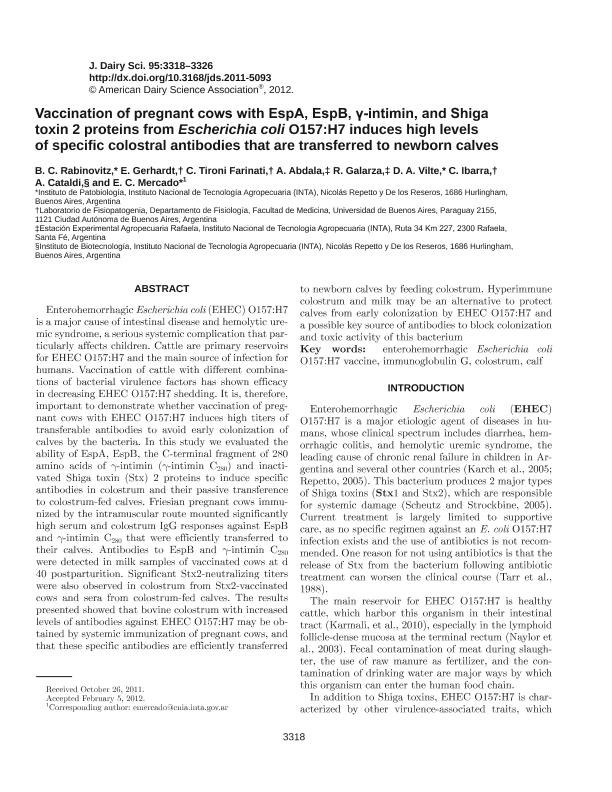Artículo
Vaccination of pregnant cows with EspA, EspB, γ-intimin, and Shiga toxin 2 proteins from Escherichia coli O157:H7 induces high levels of specific colostral antibodies that are transferred to newborn calves
Rabinovitz, Bettina Carol ; Gerhardt, E.; Tironi Farinati, Alicia Carla Flavia
; Gerhardt, E.; Tironi Farinati, Alicia Carla Flavia ; Abdala, A.; Galarza, R.; Vilte, D. A.; Ibarra, Cristina Adriana
; Abdala, A.; Galarza, R.; Vilte, D. A.; Ibarra, Cristina Adriana ; Cataldi, Angel Adrian
; Cataldi, Angel Adrian ; Mercado, Elsa Cristina
; Mercado, Elsa Cristina
 ; Gerhardt, E.; Tironi Farinati, Alicia Carla Flavia
; Gerhardt, E.; Tironi Farinati, Alicia Carla Flavia ; Abdala, A.; Galarza, R.; Vilte, D. A.; Ibarra, Cristina Adriana
; Abdala, A.; Galarza, R.; Vilte, D. A.; Ibarra, Cristina Adriana ; Cataldi, Angel Adrian
; Cataldi, Angel Adrian ; Mercado, Elsa Cristina
; Mercado, Elsa Cristina
Fecha de publicación:
06/2012
Editorial:
Elsevier
Revista:
Journal of Dairy Science
ISSN:
0022-0302
Idioma:
Inglés
Tipo de recurso:
Artículo publicado
Clasificación temática:
Resumen
Enterohemorrhagic Escherichia coli (EHEC) O157:H7 is a major cause of intestinal disease and hemolytic uremic syndrome, a serious systemic complication that particularly affects children. Cattle are primary reservoirs for EHEC O157:H7 and the main source of infection for humans. Vaccination of cattle with different combinations of bacterial virulence factors has shown efficacy in decreasing EHEC O157:H7 shedding. It is, therefore, important to demonstrate whether vaccination of pregnant cows with EHEC O157:H7 induces high titers of transferable antibodies to avoid early colonization of calves by the bacteria. In this study we evaluated the ability of EspA, EspB, the C-terminal fragment of 280 amino acids of γ-intimin (γ-intimin C280) and inactivated Shiga toxin (Stx) 2 proteins to induce specific antibodies in colostrum and their passive transference to colostrum-fed calves. Friesian pregnant cows immunized by the intramuscular route mounted significantly high serum and colostrum IgG responses against EspB and γ-intimin C280 that were efficiently transferred to their calves. Antibodies to EspB and γ-intimin C280 were detected in milk samples of vaccinated cows at d 40 postparturition. Significant Stx2-neutralizing titers were also observed in colostrum from Stx2-vaccinated cows and sera from colostrum-fed calves. The results presented showed that bovine colostrum with increased levels of antibodies against EHEC O157:H7 may be obtained by systemic immunization of pregnant cows, and that these specific antibodies are efficiently transferred to newborn calves by feeding colostrum. Hyperimmune colostrum and milk may be an alternative to protect calves from early colonization by EHEC O157:H7 and a possible key source of antibodies to block colonization and toxic activity of this bacterium.
Archivos asociados
Licencia
Identificadores
Colecciones
Articulos(OCA HOUSSAY)
Articulos de OFICINA DE COORDINACION ADMINISTRATIVA HOUSSAY
Articulos de OFICINA DE COORDINACION ADMINISTRATIVA HOUSSAY
Articulos(SEDE CENTRAL)
Articulos de SEDE CENTRAL
Articulos de SEDE CENTRAL
Citación
Rabinovitz, Bettina Carol; Gerhardt, E.; Tironi Farinati, Alicia Carla Flavia; Abdala, A.; Galarza, R.; et al.; Vaccination of pregnant cows with EspA, EspB, γ-intimin, and Shiga toxin 2 proteins from Escherichia coli O157:H7 induces high levels of specific colostral antibodies that are transferred to newborn calves; Elsevier; Journal of Dairy Science; 95; 6; 6-2012; 3318-3326
Compartir
Altmétricas



